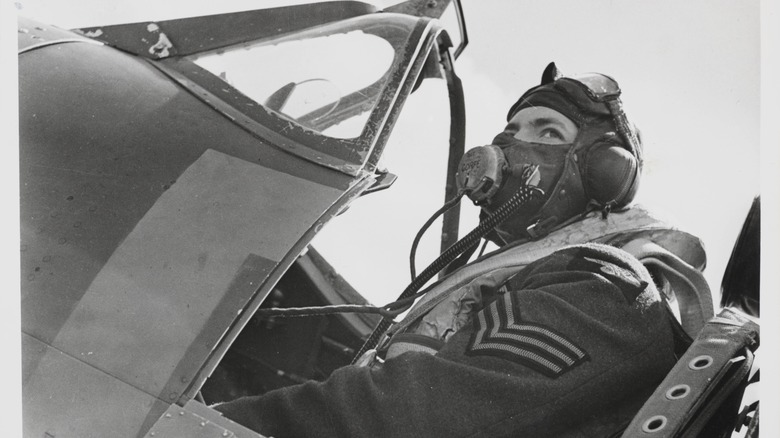Who Is Murphy's Law Named After?
Everybody is bedeviled by mishaps, unmet expectations, and things not going according to plan. Sometimes, a series of errors will compound, and one minor mistake can lead to huge headaches down the road. It's a routine part of daily life: sometimes the systems we rely on will fail, and we have to deal with it.
In some industries, such as aviation or the military, where absolute precision is a matter of life and death, failures are more than just mere annoyances. What's more, due to the nature of these jobs, there are far more opportunities for things to go wrong. And it was in the context of aviation and the military that the famed "Murphy's Law" entered into the English lexicon. For those not familiar, Murphy's Law states that "Anything that can go wrong, will go wrong" (or something like that — there's no agreed-upon official syntax).
But Murphy was a real person, according to Quartz, and he really did say something akin to what history says he said.
There were outspoken fatalists before murphy
Humans have been contending with failure ever since our species first climbed down from the trees. Humans have also probably been complaining about failure ever since the dawn of spoken language. As such, it stands to reason that there would be written records of people muttering something similar to Murphy's Law long before Murphy was even born. And as it turns out, there is.
In 1866, according to the Washington Post, Mathematician Augustus De Morgan wrote, "Whatever can happen will happen if we make trials enough." Similarly, in 1877 a man named Alfred Holt wrote about the difficulties of ocean navigation. "It is found that anything that can go wrong at sea generally does go wrong sooner or later," he wrote, via the American Dialect Society. Similarly, via another American Dialect Society archived post, in 1908 stage magician Nevil Maskelyne wrote that, "It is an experience common to all men to find that, on any special occasion, such as the production of a magical effect for the first time in public, everything that can go wrong will go wrong."
Murphy was an engineer
Most people who have laws named after them are legislators (such as the Volstead Act),crime victims (such as Megan's Law), or are philosophers, scientists, or researchers (Newton's Third Law, for example). Ed Murphy fell under the scientist category; he was an engineer.
As CTECH explains, Ed Murphy was born in 1918, and served as a fighter pilot during World War II. His service wasn't particularly exceptional, and after leaving the military he studied engineering and then went into practice. It was during the late 1940s that he famously coined the phrase (or something like it) that would become known as "Murphy's Law" while testing aviation equipment. At this point in his career he'd become a research and development director at the Wright Air Development Center of Wright-Patterson Air Force Base. It was in his role as a developer and tester of military aviation equipment that the series of events that led to "Murphy's Law" took place.
The origin of Murphy's Law
By the late 1940s, according to Quartz, advances in aviation meant that fighter pilots were flying at speeds only dreamed of a few years earlier, as World War II was raging. In 1947, Chuck Yeager broke the sound barrier, and the military was keen to see its fighter jets reaching even faster speeds. However, there were several problems, not the least of which was the fact that the pilots of those aircraft, should they eject via their parachutes, would face such deceleration that it would easily maim if not kill them. As such, Murphy and his team at Edwards Air Force Base were trying to figure out just how much deceleration a human could endure and live to tell about it.
After one test, according to CTECH, Murphy and his team found that the sensors produced zero data; none of them registered anything at all. After looking things over, the team found that 16 key sensors hadn't been plugged in properly; rather, they'd been plugged in upside down. This caused an exasperated Murphy, visiting in his capacity as a reliability engineer to say ... well, he said something, but what he actually said remains in dispute decades later.
Nobody really knows what Murphy said
If you're going to make a pithy quote, make sure you're near someone who's going to write it down. Otherwise, your quote is likely to get mangled, confused, and misquoted. That's exactly what happened to Ed Murphy and his quote that became "Murphy's Law."
After a frustrating experiment in which gauges malfunctioned because they were reportedly installed upside-down, Murphy grumbled something in frustration. According to CTECH, what he said was, "If that guy has any way of making a mistake, he will," while looking at one of his assistants. However, according to Mental Floss and Quartz, he blamed his subordinates as a group, as opposed to just one man, reportedly saying, "If there's any way they can do it wrong, they will."
Sometime later, reporters were interviewing flight surgeon John Paul Stapp, and he told them that, "We do all of our work in consideration of Murphy's Law," and then further explained that, before conducting a test, it's important to "think through all possibilities."
So how did we get from Murphy's frustration and Stapp's explanation to the "law" that is only vaguely similar to what Murphy actually said? CTECH says that the first use of the phrase "Murphy's Law" in connection with the idea that, if anything can go wrong, it will, came in Anne Roe's 1951 book, "The Making of a Scientist."
Murphy reportedly hated being associated with Murphy's Law
The turn of phrase that came to be known as "Murphy's Law" came about years after Murphy said what he said, which was only obliquely similar to the truism that "anything that can go wrong, will go wrong." Further, what Murphy said was in response to a specific set of issues, and not about the universe's indifference (or even hostility) toward us humans.
And Murphy himself was rather salty about all of that, according to CTECH. Specifically, after Murphy died in 1990, his son said that the engineer hated being associated with any random inconvenience. For example, as CTECH notes, if someone missed the bus, they would cite Murphy's Law, which would make Murphy himself rage, because something like this is the result of bad planning, and not the result of an unexpected failure despite careful planning.
John Paul Stapp, for his part, also had a take on Murphy's experience that doesn't jibe with the fatalism of Murphy's Law. As Quartz notes, what Stapp took from the test failure was that errors happen, and as such, it should be motivation to excel, rather than just accept that failure is inevitable.





